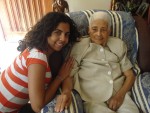Taking steps to cure Alzheimer’s

My grandmother no longer recognizes me. She can no longer walk by herself and her words trail off into oblivion when she speaks. She is always anxious to get up and leave and can no longer chew solid foods.
My grandmother has Alzheimer’s disease.
Alzheimer’s is a progressive brain disorder that destroys brain cells and causes problems with memory, thinking and behavior. It is the sixth-leading cause of death in the United States, according to the Alzheimer’s Association Web site. The problems with memory caused by the disease are severe enough to affect a victim’s work, daily activities and social life.
My grandmother was diagnosed about three years ago. When I visited her in the Dominican Republic two years ago, I was aware of her condition but was unfamiliar with the disease.
She would ask to go home and see her parents, who had both been dead for many years. She also had difficulty expressing complete thoughts. My grandmother was slipping away, but still recognized me from time to time. I convinced myself it wasn’t that bad.
Before flying to visit her this summer, I was warned by my family about her state: Alzheimer’s is fatal — there is no known cure.
When I arrived, I found what seemed like remnants of my grandmother. She was thin and fragile and hardly spoke a word. I sat beside her, held her hand and told her how much I love her. She just stared back silently, her eyes expressionless. Afterward, I found myself slumped on the floor of the garage, crying and unable to stand.
When I returned from my visit, I grew hungry for information. I watched documentaries about the disease, read articles and browsed awareness Web sites. This drive led me to Memory Walk 2008.
Memory Walk is an annual walk held by the Alzheimer’s Association, a not-for-profit organization that is the leading voluntary health organization in Alzheimer’s care, support and research, according to its Web site. The walk is being held throughout the nation at different dates. I registered to participate in the walk Saturday at the St. Petersburg Pier. The three-mile walk begins at 9 a.m.
Gloria Smith, president and CEO of the Alzheimer’s Association’s Florida Gulf Coast chapter, said the walk has a dual goal: to raise funds to support the association’s services for caregivers and to increase awareness. The Florida Gulf Coast chapter serves 17 counties in which 187,000 people live with the disease, according to its Web site.
“We are disproportionately affected — meaning we have more cases than most states in our area,” she said. “I don’t think people have any idea the numbers of cases we’re dealing with.”
Smith said the Alzheimer’s Association, along with many other non-profit organizations, has been affected by declines in state funding over the years.
The demand for their services keeps increasing while their resources continually decline, causing the association to rely on the community for fundraising even more than in years past, she said.
“We need to make sure that families know that there are people here to help when they need it and what services we provide,” Smith said.
Chuck Albrecht, vice president of the Alzheimer’s Association’s Florida Gulf Coast chapter, said that if the chapter were a state, it would have the fourth-highest incidence of Alzheimer’s disease out of all states.
The Alzheimer’s Association Web site states that more than 200,000 people have registered to participate in Memory Walk nationwide.
More than 1,000 people have registered for the walk in St. Petersburg, Albrecht said, and he hopes to see at least 1,200 people registered by Saturday. More than $100,000 has been raised thus far.
Though there are people who don’t know anyone with Alzheimer’s, Smith said they will, if they look at the numbers. One in eight people over the age of 65 and 50 percent of people over the age of 85 are diagnosed with Alzheimer’s disease, she said.
Albrecht encourages people to participate in the walk Saturday because of the disease’s prevalence.
“Everyone is impacted somehow,” he said. “They don’t know it, but they are.”
It has been an enormous heartache for my family to see my grandmother in the condition she’s in and know that she will only get worse.
Alzheimer’s has seven stages. In the final stage, patients lose the ability to respond to their environment and, ultimately, to control movement. I fear that stage and recognize there is nothing that can be done to cure my grandmother, but I look forward to the day a cure is found so no one will have to go through what my family is going through.
Since my grandmother lives in another country, I can’t see her whenever I’d like to — but by participating in this walk, I feel as if she’s beside me.
For more information on Memory Walk, visit alz.org/memorywalk/team.asp.







